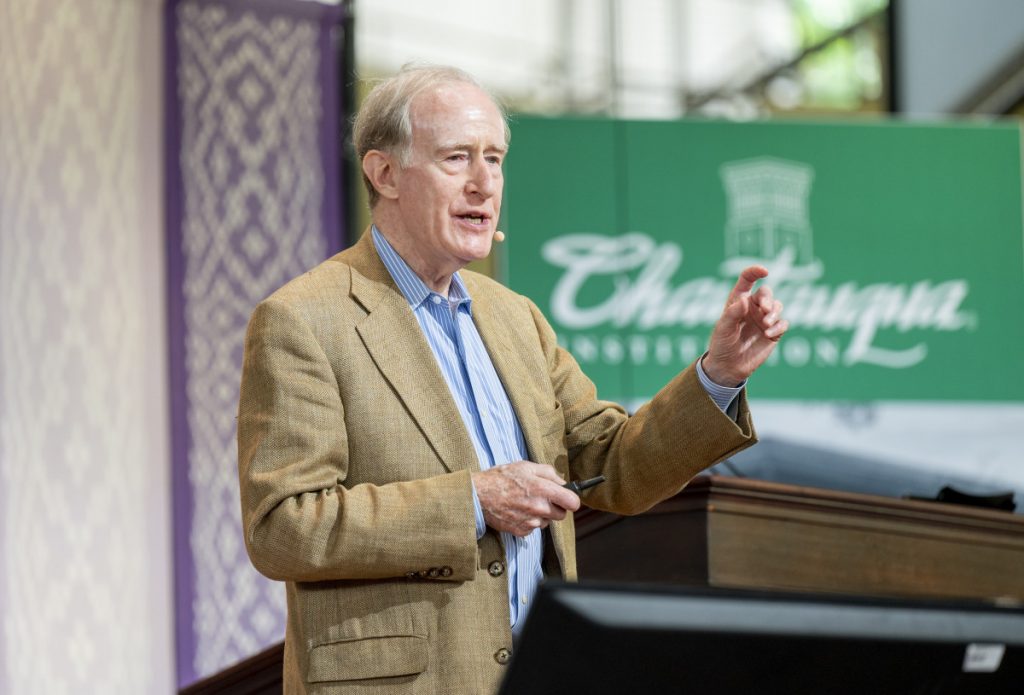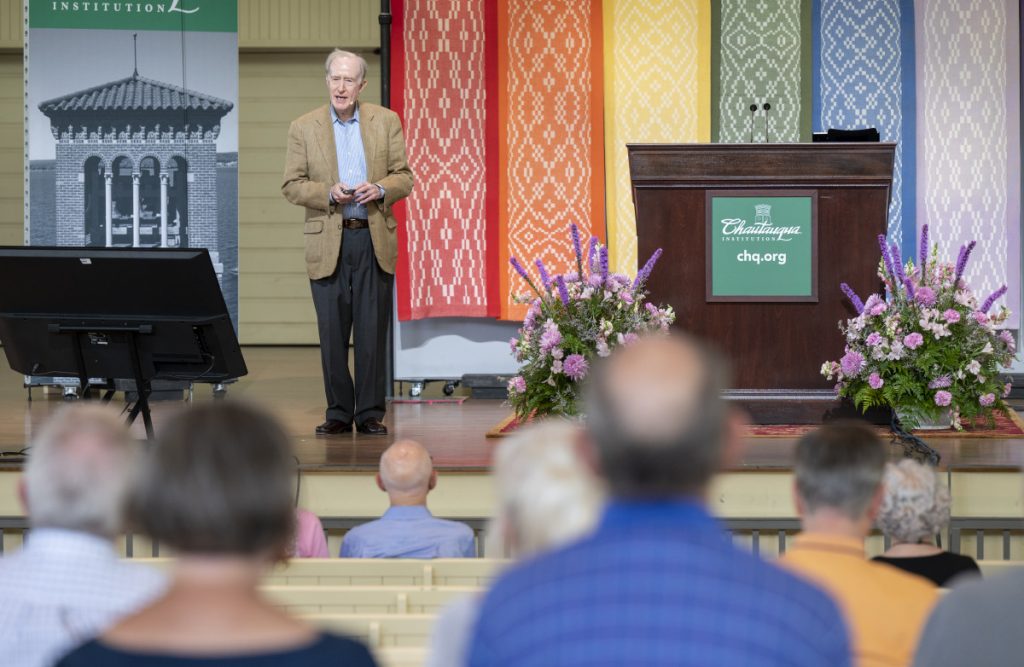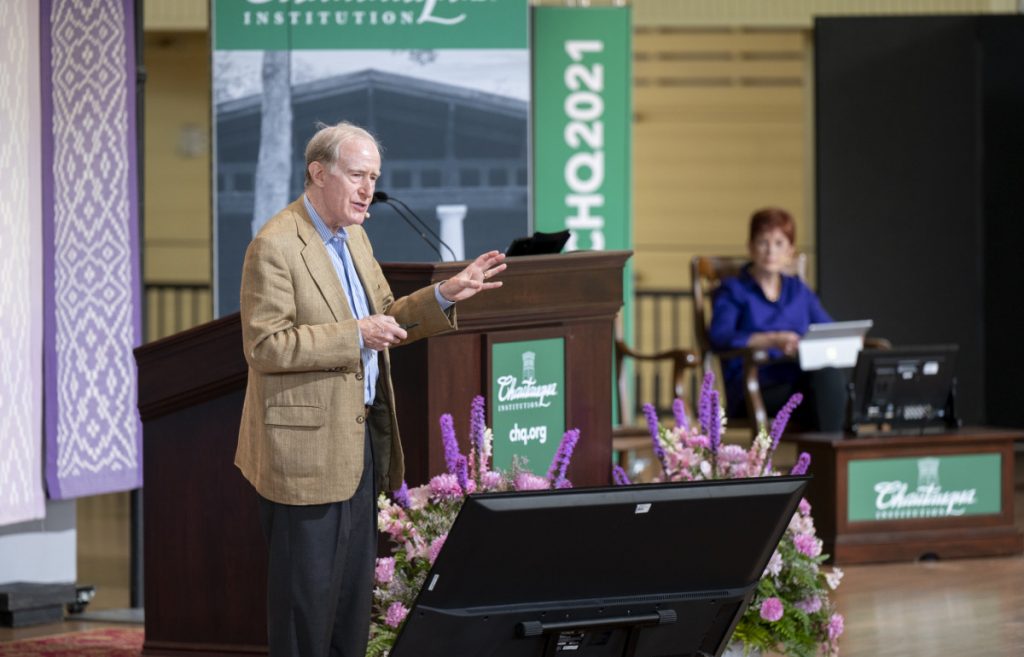MAX ZAMBRANO – STAFF WRITER

As it turns out, Chautauqua has a connection to an important part of economic history. The textbook Outlines of Economics, the bestselling economics textbook in the early 20th century, was originally published in 1889 as part of the Chautauqua Literary and Scientific Circle.
Benjamin M. Friedman wanted people to realize this connection to set the basis of looking back in time. In his Interfaith Lecture on Aug. 10 in the Amphitheater, Friedman explored a couple questions: Where did modern Western economics come from, and why did it emerge when, and where, it did?
His lecture, “Religion and the Rise of Capitalism,” was the second of three Week Seven lectures themed “Creating an Economy that Works for All.”
Friedman knows a thing or two about the economy. He’s spent his entire career at Harvard University, entering his 50th year as a professor there this fall as the William Joseph Maier Professor of Political Economy. He also earned his bachelor’s, master’s and doctoral degrees at Harvard.
For Tuesday’s lecture, he drew from ideas in his latest book, also named Religion and the Rise of Capitalism.
To begin to answer his questions, Friedman looked at the first fundamental welfare theorem, which is the idea that individuals acting in their own self-interest in a competitive market will better the lives of both themselves and others.
“If you pause to think about it, this is a very fundamental and important insight into not just human behavior, but consequences of human behavior as organized by society,” Friedman said.
There are two presumptions about this theorem’s origin, he said, first pointing to Adam Smith’s 1776 book The Wealth of Nations. The second presumption is that Smith, David Hume and other figures of that era in economics, who essentially founded modern economics, were products of the Enlightenment.
Friedman said the Enlightenment is often viewed as a movement away from a God-centered universe to secular humanism, and that none of this economic thinking had anything to do with religion.
He does accept the first presumption, but rejects the second.
“The entire path of modern economics, ever since Smith, has been powerfully influenced by trends of modern religious thinking,” Friedman said. “The originating impulse was a movement away from predestination Calvinism, which I will argue opened up the way for benign and optimistic views of human character and, importantly, a more expansive view of the possibilities of human agency.”
He noted, however, that Smith and Hume were not religious figures, or even proponents for religion. Friedman suspects, as it’s not confirmed, that Hume was an atheist, and there is no evidence that Smith was a religious believer but perhaps more aligned with 18th century Deism, like Founding Fathers Benjamin Franklin and Thomas Jefferson.
Instead, Friedman subscribes to Albert Einstein’s concept of a worldview, or that people’s time and place influences the way they think, he said. This concept simplifies the task of analyzing the world, he said. Einstein developed this concept with regard not just to physicists, but painters, poets and philosophers, for example.
Friedman highlighted philosophers because that is how Smith viewed himself — the word “economist” wasn’t yet created.
He also noted economist Joseph Schumpeter’s term “pre-analytic Vision.”
The movement away from predestination Calvinism largely defined the time and place of Smith and Hume, Friedman said.
This transition was stark. At the beginning of the 1700s, individuals were not trusted to correctly perceive their economic self-interest. If they did correctly perceive it, there was no option for acting on it and benefiting others, Friedman said. Therefore, acting in self-interest was seen as vicious, he said.
By 1790, the year Smith died, it was assumed that individuals could correctly perceive self-interest when they were producers of goods or services, Friedman said. The same wasn’t quite true for consumers. Instead, Smith described their actions as “frivolous” and “stupid.”
When people did correctly perceive their self-interest in the economic sphere, under the right conditions like a competitive market, they would make decisions that benefited others. As a result, it was no longer seen as vicious to act on one’s own self-interest.
Smith’s perspective was based on several predecessors, but Friedman argued Smith should still be the one getting the most credit because others had no awareness of the role of markets or competitive mechanism.
The desire to improve oneself is inborn, Friedman said about Smith’s thought. Smith also wrote about the system of competitive markets generating prices and wages, and these set wages and prices are the product of bargaining so both the buyer and seller can achieve the best price.
“Our actions make others better off even though we don’t intend it,” Friedman said.
This notion is behind the phrase the “invisible hand,” he said.

Smith has received tough treatment from economic conservatives since 1776, Friedman said.
“Smith did not think of the competitive market mechanism as some kind of fragile hothouse flower that needed to be protected and defended from any threat whatsoever,” he said. “Instead, what impressed him was the incredible robustness and power of implication and of the combination of human drive and the way society is organized.”
For example, Smith was in favor of progressive income taxes and luxury taxes, Friedman said.
“He wrote that people who rode around in luxury carriages ought to pay a special tax on them,” he said.
He thought the revenue should help the poor, and was also in favor of taxes on whiskey, distilleries and tighter regulations on banks and banking, Friedman said.
Smith was enabled to come to these conclusions for several reasons. First, he was trained in an era of Newtonian ideas of systems and mechanism, Friedman said. Second, he was educated in stoic philosophy, or the natural harmony of the universe. Third, he lived in an increasingly commercialized society, and fourth, he was observant.
But a key factor, Friedman said, was that Smith lived at the height of this transition away from predestination-oriented Calvinism.
There were many elements in this transition, he said, but focused on three for the purpose of economics.
One was human nature, he said. John Calvin wrote that humans are unable to tell between good and evil, while post-Calvinists believe everyone is born with some inherent goodness, Friedman said.
Another was human destiny. Calvin believed humans had no ability to save themselves because their life and afterlife was determined before the world was created. During and after this transition, people began to believe humans’ choices and actions could save them.
Third was human purpose, which Calvin believed was in the glory of God. Later, people instead put more emphasis on human happiness.
“If it was not only possible that we could tell good from wrong and we could take actions that would matter in the spiritual realm, why couldn’t we take actions that make people better off in the earthly realm, as well?” Friedman said. “If the divine purpose for our being here is to make us happy, then why wouldn’t human institutions like markets and commerce be designed for that end?”
Religion played a much more important and central role in society in the days of Smith than now, Friedman said, such as all education institutions being tied to religious foundations.
In addition, intellectual life was more integrated then versus now, he said. At Harvard and Yale, for instance, theologians and church historians are segregated from the main campus, he said. When Smith was professor at the University of Glasgow, everything was together.
Also, religious debate was deadly during Smith’s lifetime. Several wars and conflicts, like the Thirty Years’ War, English Civil War and Highland Rebellion were extremely bloody, Friedman said.
“For all of these reasons, you could not help but pay attention to religious debate if you were living then,” he said.
Religiously motivated economic thinking is still a part of the economy, he said.
“Today, economics is still about human choices and their possibilities,” he said. “The first fundamental welfare theorem is still at the heart of our analytical apparatus. Smith’s and Hume’s more expansive and optimistic view of human agency remains ours, as well.”
This remains true despite less debate between people about the merits of predestination or non-predestination thinking, he said. He looked at this through a political lens.
“In states like Kentucky or Mississippi, the fraction of the population that relies on programs like food stamps, subsidized housing and supplemental income is much, much higher than other parts of the country,” he said. “Yet, these states also have populations that systematically vote for candidates that want to shrink or dismantle these programs.”
Political scientists solve this puzzle with two factors of democracy. One, the United States has an indirect representative democracy where people vote for candidates, not policies. Two, there are not enough political parties to give people choices from all the relevant policy combinations, Friedman said.
Friedman decided to look at how people align politically. If an individual favors economic policies that favor high-income people and support socially conservative policies, they would fit into the Republican Party, he said.

Conversely, those who favored policies that benefit low-income citizens and are in favor of socially liberal policies will fit in with the Democratic Party, he said.
“What about people who would benefit from policies like food stamps, supplemental income and subsidized housing, but nonetheless don’t like abortion or same-sex marriage?” he said.
Political scientists would answer that they care more about socially conservative policies, therefore falling in the Republican Party, he said. Friedman found in the 2016 election about one-third of the electorate was in this category.
He decided to look at opinion surveys to see religion’s role.
In a poll that determined the share of the population preferring a smaller government providing fewer services, 51% of all Americans were in favor. Fifty-nine percent of mainline Protestants were in support, 64% of evangelical Protestants, too, as were 69% of traditionalist evangelicals.
Friedman said political scientists had no answer to that, but he thinks understanding the role of economics and religious thinking helps understand these origins.
In another poll stating, “Government aid to the poor does more good than harm because people can’t get out of poverty until their basic needs are met,” 50% of Americans agreed. Of mainline Protestants, 46%; evangelical Protestants, 38%; and traditionalist evangelicals, 33%.
In one more, he looked at support for estate taxes. Forty-four percent of Americans would prefer to abolish it, he said. This time, he compared the average income for various groups of Americans to their view on the estate tax.
Republicans have higher incomes, on average, and are more likely to oppose an estate tax. Democrats have slightly lower incomes, on average, and are less likely to be opposed to an estate tax. Mainline Protestants have slightly higher-than-average incomes and are more opposed to an estate tax.
Evangelicals, however, have slightly lower average incomes but are more likely to oppose an estate tax.
“My view is we simply cannot understand the current level of political impasse in the United States by ignoring the role of religious thinking,” he said.
Economics was a product of the Enlightenment, he said, but religious thinking is still central to its story.
“The role of religious thinking continues to be at work today, especially in America in our ongoing debate over economic policy,” he said.




